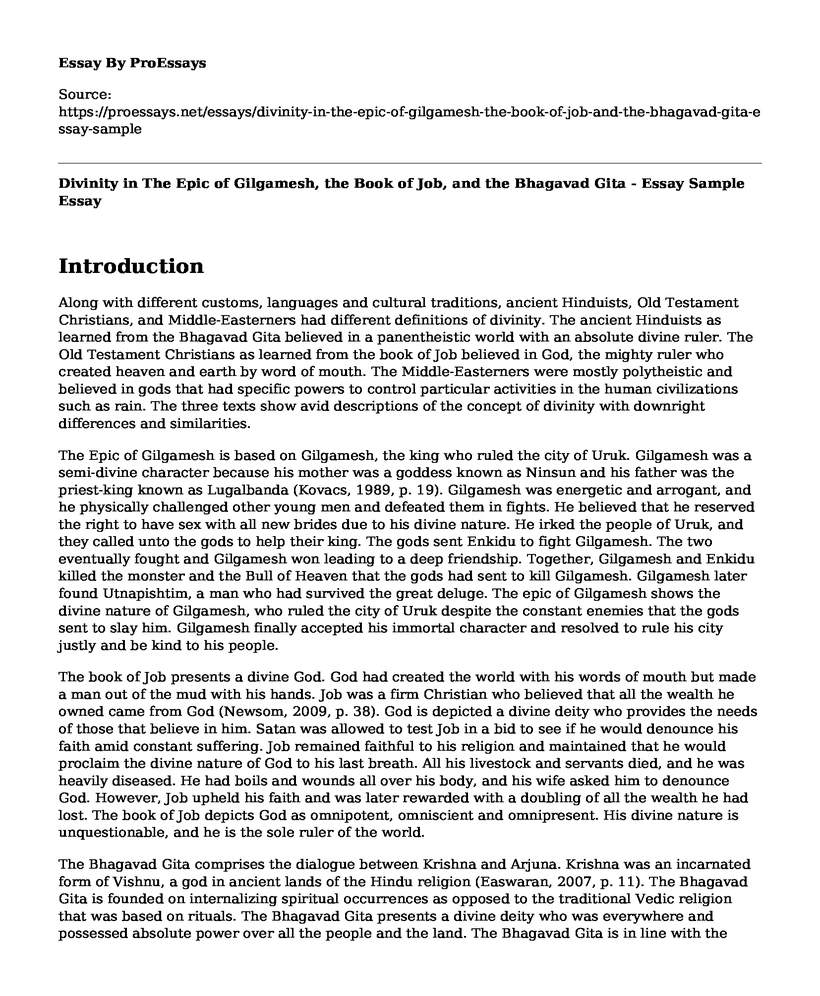Introduction
Along with different customs, languages and cultural traditions, ancient Hinduists, Old Testament Christians, and Middle-Easterners had different definitions of divinity. The ancient Hinduists as learned from the Bhagavad Gita believed in a panentheistic world with an absolute divine ruler. The Old Testament Christians as learned from the book of Job believed in God, the mighty ruler who created heaven and earth by word of mouth. The Middle-Easterners were mostly polytheistic and believed in gods that had specific powers to control particular activities in the human civilizations such as rain. The three texts show avid descriptions of the concept of divinity with downright differences and similarities.
The Epic of Gilgamesh is based on Gilgamesh, the king who ruled the city of Uruk. Gilgamesh was a semi-divine character because his mother was a goddess known as Ninsun and his father was the priest-king known as Lugalbanda (Kovacs, 1989, p. 19). Gilgamesh was energetic and arrogant, and he physically challenged other young men and defeated them in fights. He believed that he reserved the right to have sex with all new brides due to his divine nature. He irked the people of Uruk, and they called unto the gods to help their king. The gods sent Enkidu to fight Gilgamesh. The two eventually fought and Gilgamesh won leading to a deep friendship. Together, Gilgamesh and Enkidu killed the monster and the Bull of Heaven that the gods had sent to kill Gilgamesh. Gilgamesh later found Utnapishtim, a man who had survived the great deluge. The epic of Gilgamesh shows the divine nature of Gilgamesh, who ruled the city of Uruk despite the constant enemies that the gods sent to slay him. Gilgamesh finally accepted his immortal character and resolved to rule his city justly and be kind to his people.
The book of Job presents a divine God. God had created the world with his words of mouth but made a man out of the mud with his hands. Job was a firm Christian who believed that all the wealth he owned came from God (Newsom, 2009, p. 38). God is depicted a divine deity who provides the needs of those that believe in him. Satan was allowed to test Job in a bid to see if he would denounce his faith amid constant suffering. Job remained faithful to his religion and maintained that he would proclaim the divine nature of God to his last breath. All his livestock and servants died, and he was heavily diseased. He had boils and wounds all over his body, and his wife asked him to denounce God. However, Job upheld his faith and was later rewarded with a doubling of all the wealth he had lost. The book of Job depicts God as omnipotent, omniscient and omnipresent. His divine nature is unquestionable, and he is the sole ruler of the world.
The Bhagavad Gita comprises the dialogue between Krishna and Arjuna. Krishna was an incarnated form of Vishnu, a god in ancient lands of the Hindu religion (Easwaran, 2007, p. 11). The Bhagavad Gita is founded on internalizing spiritual occurrences as opposed to the traditional Vedic religion that was based on rituals. The Bhagavad Gita presents a divine deity who was everywhere and possessed absolute power over all the people and the land. The Bhagavad Gita is in line with the Upanishadic Brahman theme of a "neuter principle" that ruled the Hindu world. The Brahma made the demons, gods, and humans and assigned each to a specific sphere. The demons are villainous, while the gods show divinity and humans show both divinity and evil. The divinity of the gods is unquestionable, and humans can only satisfy the gods by mastering and abiding by the divine qualities provided by the Vedas.
Conclusion
The three texts show similarity in their regard to the divine nature of the supernatural being. The only difference is the nature of religious belief as monotheism and polytheism. They portray God and the gods as divine rules who control and effect punishments on people based on their behaviors. Their power is unparalleled and their nature indescribable by human features.
References
Easwaran, E. (2007). The Bhagavad Gita:(Classics of Indian Spirituality). Nilgiri Press.
Kovacs, M. G. (1989). The epic of Gilgamesh. Stanford University Press.
Newsom, C. A. (2009). The book of Job: a contest of moral imaginations. Oxford University Press.
Cite this page
Divinity in The Epic of Gilgamesh, the Book of Job, and the Bhagavad Gita - Essay Sample . (2022, Nov 14). Retrieved from https://proessays.net/essays/divinity-in-the-epic-of-gilgamesh-the-book-of-job-and-the-bhagavad-gita-essay-sample
If you are the original author of this essay and no longer wish to have it published on the ProEssays website, please click below to request its removal:
- Law According to the Old and the New Testament
- The Eucharist Sacrament, Sign, and Symbols Essay
- Article Analysis Essay on Spirituality and Religion in Counselling
- Daniel Talks About King Nebuchadnezzar's Dream Paper Example
- Women and the Bible Essay Example
- Romans 13:11 "The Day is Near" - Essay Sample
- Jesus of Nazareth: Messiah and Religious Leader of Christianity - Essay Sample







